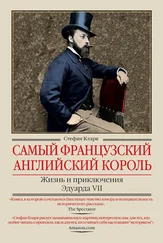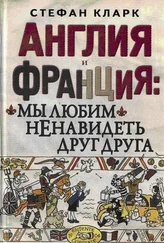Стефан Кларк - 1000 Years of Annoying the French
Здесь есть возможность читать онлайн «Стефан Кларк - 1000 Years of Annoying the French» весь текст электронной книги совершенно бесплатно (целиком полную версию без сокращений). В некоторых случаях можно слушать аудио, скачать через торрент в формате fb2 и присутствует краткое содержание. ISBN: , Издательство: Transworld Digital, Жанр: Старинная литература, на английском языке. Описание произведения, (предисловие) а так же отзывы посетителей доступны на портале библиотеки ЛибКат.
- Название:1000 Years of Annoying the French
- Автор:
- Издательство:Transworld Digital
- Жанр:
- Год:неизвестен
- ISBN:9781407067629
- Рейтинг книги:3 / 5. Голосов: 1
-
Избранное:Добавить в избранное
- Отзывы:
-
Ваша оценка:
- 60
- 1
- 2
- 3
- 4
- 5
1000 Years of Annoying the French: краткое содержание, описание и аннотация
Предлагаем к чтению аннотацию, описание, краткое содержание или предисловие (зависит от того, что написал сам автор книги «1000 Years of Annoying the French»). Если вы не нашли необходимую информацию о книге — напишите в комментариях, мы постараемся отыскать её.
1000 Years of Annoying the French — читать онлайн бесплатно полную книгу (весь текст) целиком
Ниже представлен текст книги, разбитый по страницам. Система сохранения места последней прочитанной страницы, позволяет с удобством читать онлайн бесплатно книгу «1000 Years of Annoying the French», без необходимости каждый раз заново искать на чём Вы остановились. Поставьте закладку, и сможете в любой момент перейти на страницу, на которой закончили чтение.
Интервал:
Закладка:
Interestingly, though, the usual French version of the story is that he ate ‘lamproies avariées’ – lampreys that had gone bad. The French don’t seem to be able to accept that you can eat too much of a good thing. Given the violence of the times, though, one might also ask whether Henry’s meal hadn’t contained a hidden ingredient – a little dose of poison, perhaps.
As soon as her father was dead, Mathilde sounded out the English barons as to whether she could overcome the problem of her gender and succeed to the throne, either alone or as a regent for her son. Some of the barons had sworn allegiance to her, but in the end her marriage to an Angevin, seen by many as a rival to the Normans, counted against her, and the throne was given to one of Henry’s nephews, a French grandson of William the Conqueror’s – Stephen, Count of Blois and Boulogne.
Despite his name, Stephen was not exactly a great ruler. In fact, he managed to lose not only the English link with Normandy, but also his own English throne. He just didn’t have enough of that Conqueror blood in him, it seems. On the contrary, Stephen’s father, Etienne-Henri, was a well-known coward. He had deserted the crusader army during the siege of Antioch in 1098, infuriating his wife so much that she sent him straight back to the Middle East, where he was killed in 1102. Not a great role model for a medieval king.
And unfortunately for Stephen, Mathilde and her husband, Geoffrey of Anjou, weren’t going to give up without a fight. In 1139 Geoffrey began a systematic campaign of attrition against Normandy, while Mathilde brought an army of Angevins to invade England, basing herself in Gloucester – capital of the lamprey.
A terrible struggle between the lady from Anjou and the man from Blois broke out on British soil. The war between Mathilde and Stephen was known bluntly as the Anarchy, and gave the Anglo-Saxon Chronicle (which was in its final throes) one of its last chances to have a rant at foreigners. In its entry for 1139, the Chronicle laments that both factions of French powerbrokers kidnapped England’s ‘peasant men and women, and put them in prison for their gold and silver, and tortured them with unutterable torture’. Well, the chronicler says it was unutterable, but he manages to utter quite a lot about it:
They hanged them by the thumbs, or by the head, and hung fires on their feet; they put knotted strings about their heads, and writhed [twisted] them so that it went to the brain … Some they put in a chest that was short, and narrow, and shallow, and put sharp stones therein, and pressed the man therein, so that they broke all his limbs … I neither can nor may tell all the wounds or all the tortures which they inflicted on wretched men in this land.
As well as the everyday terror, there were pitched battles: in 1141, Stephen lost the Battle of Lincoln and was taken prisoner. Mathilde had herself crowned ‘Angliae Normanniaeque domina’, ‘Lady of the English and the Normans’, but was then defeated by an army led by Stephen’s wife, who made things even more confusing by also being called Mathilde (though she tacked on an ‘of Boulogne’ to differentiate herself).
In the end, with the wavering allegiances of the English barons only adding to the anarchy, the two factions were forced to come to an agreement: Stephen would continue to reign, and on his death the throne would pass to Mathilde’s son Henry. 3It was a fragile, unsatisfactory solution for all concerned, and as G. M. Trevelyan says in his Shortened History of England , ‘it was one of England’s great good fortunes that he [Stephen] died next year.’
Stealing a French king’s wife – not good for international relations
By birth, the future Henry II was already heir to the powerful territory of Anjou in France, via his father Geoffrey, as well as the Duchy of Normandy and the Crown of England. And at the age of nineteen he added even more land to his portfolio by marrying Eleanor of Aquitaine. Thanks again to the ‘do you have a lump in your tights?’ clause in rulership application forms, he thereby became duke of the extensive, and very rich, French territories of Aquitaine and Gascony, an area stretching from Bordeaux to the Spanish border.
This union was not only profitable – it was also a major anti-French political coup. Until only a few weeks earlier, Eleanor had been Queen of France, the wife of Louis VII. She had had the marriage annulled because Louis had produced no male heirs and, she felt, was not liable to, because, as she subtly expressed it, ‘he is a monk rather than a husband’. As soon as the annulment came through, the thirty-year-old Eleanor proposed to the teenaged Henry, who – she rightly predicted – had great prospects. She was apparently a tall, beautiful, well-educated woman who knew what she wanted and knew how to get it – and she’d already tried out Henry’s family pedigree by sleeping with his father.
As a result, in 1154, when King Stephen died and Henry (now twenty-one) was able to print an extra line – King of England – on his already crowded business card, he ruled over more ‘French’ land than Louis VII. If you look at a map of France at the time, the territories governed by Henry and Eleanor form a huge, solid slab covering the whole western half of the country, taking in almost all the north coast and stretching right down across the centre of France, only just excluding Paris. By comparison, Louis VII’s territories hang like a stringy frog’s leg across the map, from just west of Calais, down through Paris and to the Med. It is very clear who ruled France in those days, and it wasn’t the French King.
Not that Henry II did much French-bashing. He didn’t need to. Given the extent of his land-holdings, he was literally able to sit back and lord it over the French. In any case, Henry II’s reign was much less about war than peace. He was the first of England’s Plantagenet kings, named after the spring of broom flowers (in French, genêt ) that his father, Geoffrey of Anjou, wore in his hat. And as such, Henry was the founder of a dynasty that would rule England for the next 330 years. He couldn’t know that, of course, but even so he reigned like a man laying down great foundations.
He tamed the volatile barons in both England and his French territories by taking money from the noblemen in lieu of military service, thereby enabling him to pay for reliable mercenaries. He introduced trial by jury, which meant that at least some crimes would be judged by hearing evidence rather than by making the accused walk barefoot over red-hot plough shares and declaring them guilty if they got blisters. Perhaps remembering the story of his grandfather and the lampreys, Henry also gained a reputation for being generous to the hungry, redistributing a tenth of all the food delivered to his castles.
A shame, then, that the French gained one of their greatest – but least known – victories in history by tarnishing good King Henry’s name.
The murder in the cathedral
The one great blemish on Henry II’s record book is the murder of Thomas Becket, his own Archbishop of Canterbury. In Henry’s defence, though, it must be stressed that he wasn’t entirely to blame. What is not said often enough is that, in part at least, it was France’s fault.
The circumstances of the murder are a familiar story. In 1170, Henry complains loudly about Becket refusing to respect royal authority. Four of the King’s courtiers take the complaint as a hint, and go to Canterbury, where they hack off the top of Thomas’s skull and spread his brains over the cathedral floor.
However, what few people know is that Thomas Becket had spent the previous two years in exile in France, having left England to avoid signing an agreement that would have weakened the Church’s influence. And while in France, Thomas was a guest of Louis VII, the lousy lover who had been scorned by Eleanor, Henry’s wife. One can imagine Louis spending the long medieval evenings by his fireside telling Thomas how right he was to stand up to the ungodly English wife-stealer. All of which might explain why, when Thomas eventually returned to England, he was defiant enough to continue his political stand against Henry.
Читать дальшеИнтервал:
Закладка:
Похожие книги на «1000 Years of Annoying the French»
Представляем Вашему вниманию похожие книги на «1000 Years of Annoying the French» списком для выбора. Мы отобрали схожую по названию и смыслу литературу в надежде предоставить читателям больше вариантов отыскать новые, интересные, ещё непрочитанные произведения.
Обсуждение, отзывы о книге «1000 Years of Annoying the French» и просто собственные мнения читателей. Оставьте ваши комментарии, напишите, что Вы думаете о произведении, его смысле или главных героях. Укажите что конкретно понравилось, а что нет, и почему Вы так считаете.












